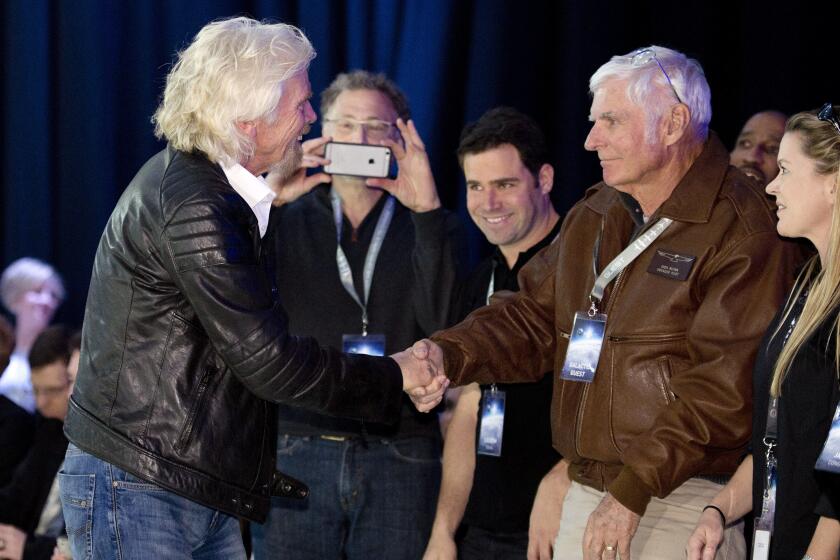Not All Stores Will Cheerfully Give Refunds
Come Dec. 26, the Day of the Big Returns, there’s no doubt in anyone’s mind that it’s better to give than to get. The thought of gift returns may even cast some pall on the purchase itself as the buyer worries whether his gift can be returned at all, what kind of exchange will be allowed and whether the recipient will get the full amount paid or only the after-Christmas sale price.
Similarly, people say their hearts sink at the thought of having to return something, and they approach a sales counter apologetic, belligerent or both. “The store makes you feel that way,” a Pomona woman says.
Not all do: “It’s No Problem at Nordstrom,” said full-page ads last Christmas Day for Nordstrom’s stores, which promise refund or exchange, with or without receipt, no time limit. “We wanted to let customers know they’re not going to be hassled,” says Betsy Sanders, vice president in charge of Nordstrom’s Southern California stores. In fact, says President Jim Nordstrom in Seattle, “we’re thrilled they come into our store. Any reason we can get them in, if we do the job right, we’ll be rewarded.”
Sales Staff’s Attitude
That view isn’t universal. Many stores, unable to see beyond the moment, are unwilling to let go of a sale. Others, liberal when pushed or publicly asked, quietly leave it to their salespeople, who may be hard-nosed--in some cases because they’d be reversing a commission along with the sale.
Retailers can do whatever they want--a rude shock to consumers who this time of year are calling local authorities to ask what their rights are and complain that “there oughta be a law.” Usually there isn’t: Instead, says Tim Bissell, chief investigator for Los Angeles County’s consumer affairs department, “the assumption is that all purchases are final unless there’s something in writing otherwise.” An oft-noted exception is New York, which requires that retailers post their return policy conspicuously or, in the absence of posting, provide cash refund or store credit for anything returned, with receipt, within 20 business days.
Small stores tend to be least liberal, not even offering refunds to a purchaser with a receipt. They usually explain that they’re “too small.” “We can’t afford to be just lending clothes out,” says the manager of a Los Angeles clothing boutique. Too many customers, he adds, just buy something, wear it for a while and then return it.
Quite a Bit of Leeway
Some stores severely limit the time for returns. Federated Group, for example, a Los Angeles-based electronics chain, has a seven-day return policy; for Christmas gifts without receipts, the countdown doesn’t start until Christmas Day, whenever the purchase, but that’s only until New Year’s Day.
Sometimes the policy is simply a stated attitude. “If it’s new and in the box and hasn’t been used, we’d exchange it for something you want, within a reasonable amount of time,” says Ed Juge, director of market planning for Fort Worth-based Radio Shack. “We try to take care of the customer.” Within that philosophy, individual stores have “a fair amount of leeway.”
All too often, it’s hard work pinning down the policy. At one store, an executive said gifts without receipts could always get refunds, but a salesperson, a store manager and, after many calls, the customer service director said the rule is merchandise credits only. At another store, an executive said the customer’s word on date of purchase was enough to refund the price at that time, but a saleswoman and another spokesman said that without a receipt, current sale price prevailed. And one chain’s president whose store personnel allowed no refunds or exchanges without a receipt said they “should have known” exchanges were permitted.
It’s the large department and specialty stores that more often consider a return an “opportunity to build good will,” in the words of Holly Schmidt, manager of customer service at Marshall Field in Chicago. Indeed, says Jack McCarley, spokesman for Los Angeles-based Bullock’s stores, “in every customer survey in two decades, the No. 1 reason people state for shopping at Bullock’s is our return policy, followed by assortment, service and ambiance.”
Bullock’s policy--anything can be returned, with or without a receipt or any identifiable Bullock’s material, as long as Bullock’s carries such an item--isn’t uncommon. Nordstrom even claims that it will take back something it doesn’t carry if the customer insists: “We were always told that if someone came in wheeling a tire and said it came from Nordstrom, we should take the return,” says Betsy Sanders.
What one gets in return is another matter. Many stores stick to the old tradition of merchandise credits, which are such a nuisance that many customers forget to use them up. Others allow refunds by cash or check. Sears, however, limits cash refunds to Sears goods: A national brand item, unaccompanied by any evidence of purchase at Sears, can be exchanged only for merchandise or credit.
With the big stores that drastically mark everything down after Christmas, however, a further question is what value the item will be assigned. In the absence of a receipt proving a purchase at full price, stores from Sears to Saks Fifth Avenue will honor only their most recent sale price--a profitable tradition if, like most Christmas gifts, it was bought before Christmas and brought back during January sales. Most would no doubt “be more than happy to replace it or refund the purchase price,” as a recent Bullock’s ad promised, but how does someone with no receipt prove the purchase price?
“I think it’s the store’s responsibility to provide a way,” said one woman angrily, and some do: All it takes is a ballpoint pen. At Nordstrom, salespeople mark the back of the ticket with numbers coded for department, salesperson, price and date: Even if the printed price is tactfully cut off, it’s clear what was paid and when.
Marshall Field marks each gift, at the sales counter, with a special sticker similarly coded--a boon to salespeople as well as customers, says Schmidt, “because it makes these transactions so much easier.”
It also takes a certain attitude. Even if a gift comes back with no information attached, complicating the process, “our intent is the same,” says Sanders. “Even if it was once $100 and is now $9.99, we’d take the before-Christmas price. It’s a philosophy that could be taken advantage of, but we have no problem with 95% of customers.”






